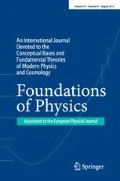Abstract
From both physical and epistemological viewpoints, the following theses, which nowadays are often discussed in the literature, are examined: Nonlinear thermodynamics renders it possible to grasp evolutionary physical processes; for thermodynamics it introduces, instead of idealized reversible time, a directed time into physics; thus a science is established that is nearer to reality than classical physics. To analyze these theses, the relation of thermodynamics to dynamical physics is considered. In particular, it is demonstrated that, in classical as well as in modern thermodynamics, irreversibility is introduced via conditions which must be formulated in addition to the dynamical laws. To show the reason for this, the epistemological status of the physical time conception is analyzed, and its character as a physical measurement quantity is established.
Similar content being viewed by others
References
I. Prigogine,Dialektik. Beitr. Phil. Wiss., No. 5, 121 (1982).
L. Boltzmann,Sitz.-Ber. Akad. Wiss. Wien (II)65, 67 (1877).
L. Boltzmann,Ann. Phys. (Leipzig) 57, 773 (1896).
L. Boltzmann,Ann. Phys. (Leipzig) 59, 793 (1896).
M. Planck, “Die Einheit des physikalischen Weltbildes,” and “Physikalische Gesetzlichkeit im Lichte neuerer Forschungen,” inPhysikalische Abhandlungen und Vorträge, Vol. III (F. Vieweg & Sohn, Braunschweig, 1958).
A. Einstein,Phys. Z. 10, 821 (1909).
L. Boltzmann, “Ein Wort der Mathematik an die Energetik,” inPopuläre Schriften (Verlag. Joh. A. Barth, Leipzig, 1905), p. 133.
K. R. Popper,Nature (London) 177, 538 (1956).
K. R. Popper,Nature (London) 178, 382 (1956).
K. R. Popper,Nature (London) 179, 1297 (1957).
K. R. Popper,Nature (London) 181, 402 (1958).
L. Rosenfeld, “Statistical Causality in Atomic Theory. A General Introduction to Irreversibility,” inSelected Papers of Léon Rosenfeld, R. S. Cohen and J. J. Stachel, eds. (D. Reidel, Dordrecht, 1979).
L. Boltzmann,Wiener Ber. 66, 275 (1872).
J. Loschmidt,Wiener Ber. 73, 128, 366 (1876).
J. Loschmidt,Wiener Ber. 75, 278 (1877).
J. Loschmidt,Wiener Ber. 76, 209 (1877).
E. Zermelo,Ann. Phys. (Leipzig) 57, 485 (1896).
E. Zermelo,Ann. Phys. (Leipzig) 60, 392 (1897).
P. Ehrenfest and T. Ehrenfest, “Begriffliche Grundlagen der statistischen Auffassung in der Mechanik,” inP. Ehrenfest: Collected Scientific Papers, M. J. Klein, ed. (North-Holland, Amsterdam, 1959), p. 258.
E. Mach,Die Principien der Wärmelehre (F. A. Brockhaus, Leipzig, 1919), p. 338.
H.-J. Treder,Geophys. Veröff. KMU Leipzig 2, 7 (1980).
I. Prigogine,From Being to Becoming—Time and Complexity in Physical Sciences (W. H. Freeman, San Francisco, 1980).
W. Ebeling,Spectrum 12, Nos. 6 and 7 (1981).
N. Bohr and L. Rosenfeld,Kgl. Dan. Vidensk. Selsk. Mat.-fys. Medd. 12, No. 8 (1933).
C. George, I. Prigogine, and L. Rosenfeld, “The Macroscopic Level of Quantum Mechanics,” inSelected Papers of Léon Rosenfeld, R. S. Cohen and J. J. Stachel, eds. (D. Reidel, Dordrecht, 1979).
R. Wahsner, “Naturwissenschaft zwischen Verstand und Vernunft,” inVom Mute des Erkennens. Beiträge zur Philosophie G. W. F. Hegels, M. Buhr and T. I. Oiserman, eds. (Akademie Verlag, Berlin, 1981).
H.-H. v. Borzeszkowski and R. Wahsner,Wirkung und Gegenwirkung. Studien zu Bewegung und Widerspruch in der Physik (in press).
K. Marx, “Zur Kritik der politischen Ökonomie,” inWerke, Vol. 13, K. Marx and F. Engels (Dietz Verlag, Berlin, 1961), p. 16.
H. v. Helmholtz,Einleitung zu den Vorlesungen über theoretische Physik, A. König and C. Runge, eds. (Verlag Joh. A. Barth, Leipzig, 1903), p. 26.
K. Marx, “Die Wertform,” inKleine ökonomische Schriften, K. Marx and F. Engels (Dietz Verlag, Berlin, 1955), p. 265.
K. Marx, “Theorien über den Mehrwert,” inWerke, Vol. 26.3, K. Marx and F. Engels (Dietz Verlag, Berlin, 1962), pp. 106–107 and 125.
J. B. d'Alembert,Traité de dynamique, dans lequel les loix de l'équilibre & du mouvement des corps sont réduites au plus petit nombre possible (David, Paris, 1743).
R. Descartes,Regulae ad directionem ingenii, H. Springmeyer, L. Gäbe, and H. Zekl, eds. (Felix Meiner Verlag, Hamburg, 1973), pp. 132–134.
C. Neumann,Über die Principien der Galilei-Newtonschen Theorie (B. G. Teubner, Leipzig, 1870).
L. Lange,Die geschichtliche Entwickelung des Bewegungsbegriffs und ihr voraussichtliches Endergebnis. Ein Beitrag zur historischen Kritik der mechanischen Prinzipien (W. Engelmann, Leipzig, 1886).
E. Cassirer,Substanzbegriff und Funktionsbegriff. Untersuchungen über die Grundfragen der Erkenntniskritik (Bruno Cassirer, Berlin, 1910), p. 192.
H. Poincaré,Rev. Métaphys. Morale 1, 534 (1893).
H.-J. Treder,Große Physiker und ihre Probleme. Studien zur Geschichte der Physik (Akad. Verlag, Berlin, 1983), pp. 179–185.
M. Planck,Wissenschaftliche Selbstbiographie (Verlag Joh. A. Barth. Leipzig, 1955), pp. 54–55.
E. Schrödinger,Die Natur und die Griechen (Zsolnay, Wien, 1955), pp. 94–95 and 155.
E. Schrödinger,Was ist ein Naturgesetz? Beiträge zum naturwissenschaftlichen Weltbild (Oldenbourg, München/Wien, 1962), pp. 33, 56, 62–63, and 72.
G. W. F. Hegel,Differenz des Fichteschen und des Schellingschen Systems der Philosophie (Reclam, Leipzig, 1981), p. 51.
E. Husserl,Die Krisis der europäischen Wissenschaften und die transzendentale Phänomenologie, Husserliana. Ges. Werke, W. Bienel, ed. (Martinus Nijhoff, The Hague, 1962), p. 52.
Author information
Authors and Affiliations
Rights and permissions
About this article
Cite this article
von Borzeszkowski, HH., Wahsner, R. Did nonlinear irreversible thermodynamics revolutionize the classical time conception of physics?. Found Phys 14, 653–670 (1984). https://doi.org/10.1007/BF00738746
Received:
Issue Date:
DOI: https://doi.org/10.1007/BF00738746




